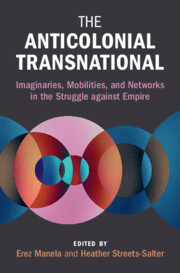Book contents
- The Anticolonial Transnational
- Global and International History
- The Anticolonial Transnational
- Copyright page
- Contents
- Figures
- Contributors
- Acknowledgments
- 1 Introduction
- Part I The Many Anticolonial Transnationals
- Part II Solidarities and Their Discontents
- 6 From Wife to Comrade: Agnes Smedley and the Intimacies of Anticolonial Solidarity
- 7 Cheikh Anta Diop’s Recovery of Egypt: African History as Anticolonial Practice
- 8 The Right to Petition in the Anticolonial Struggle at the United Nations
- 9 African Nationalism, Anti-Imperial Lexicons, and the Development of China–Tanzania Relations, 1960–1966
- Part III Anticolonialism in a Postcolonial Age
- Index
9 - African Nationalism, Anti-Imperial Lexicons, and the Development of China–Tanzania Relations, 1960–1966
from Part II - Solidarities and Their Discontents
Published online by Cambridge University Press: 10 August 2023
- The Anticolonial Transnational
- Global and International History
- The Anticolonial Transnational
- Copyright page
- Contents
- Figures
- Contributors
- Acknowledgments
- 1 Introduction
- Part I The Many Anticolonial Transnationals
- Part II Solidarities and Their Discontents
- 6 From Wife to Comrade: Agnes Smedley and the Intimacies of Anticolonial Solidarity
- 7 Cheikh Anta Diop’s Recovery of Egypt: African History as Anticolonial Practice
- 8 The Right to Petition in the Anticolonial Struggle at the United Nations
- 9 African Nationalism, Anti-Imperial Lexicons, and the Development of China–Tanzania Relations, 1960–1966
- Part III Anticolonialism in a Postcolonial Age
- Index
Summary
This chapter traces the arc of China–Tanzania relations across significant events in early Tanzanian history: Tanganyikan independence in December 1961; the January 1964 Zanzibar Revolution; and the Union of Tanganyika and Zanzibar that followed. In doing so, it highlights the promises and tensions embedded within socialist articulations of anticolonial transnationalism. In mainland Tanganyika, African nationalists – long resentful of Indian economic dominance in colonial East Africa – embraced Chinese efforts to condemn Indians as “native reactionaries” and “imperial collaborators” in light of the 1962 Sino-Indian Border War. But in Zanzibar, one-time capital of the Omani Empire, where the Arab minority retained political privileges during British rule, Chinese representatives conflicted with their counterparts as to whether Arabs comprised “feudalists” and “exploiters” or belonged to the global working class. In both cases, colonial racial dynamics strongly affected the possibilities for socialist anti-imperial solidarities, before and after formal decolonization.
- Type
- Chapter
- Information
- The Anticolonial TransnationalImaginaries, Mobilities, and Networks in the Struggle against Empire, pp. 177 - 196Publisher: Cambridge University PressPrint publication year: 2023

